Printed material relating to John Simpson Kirkpatrick, 1915-1916
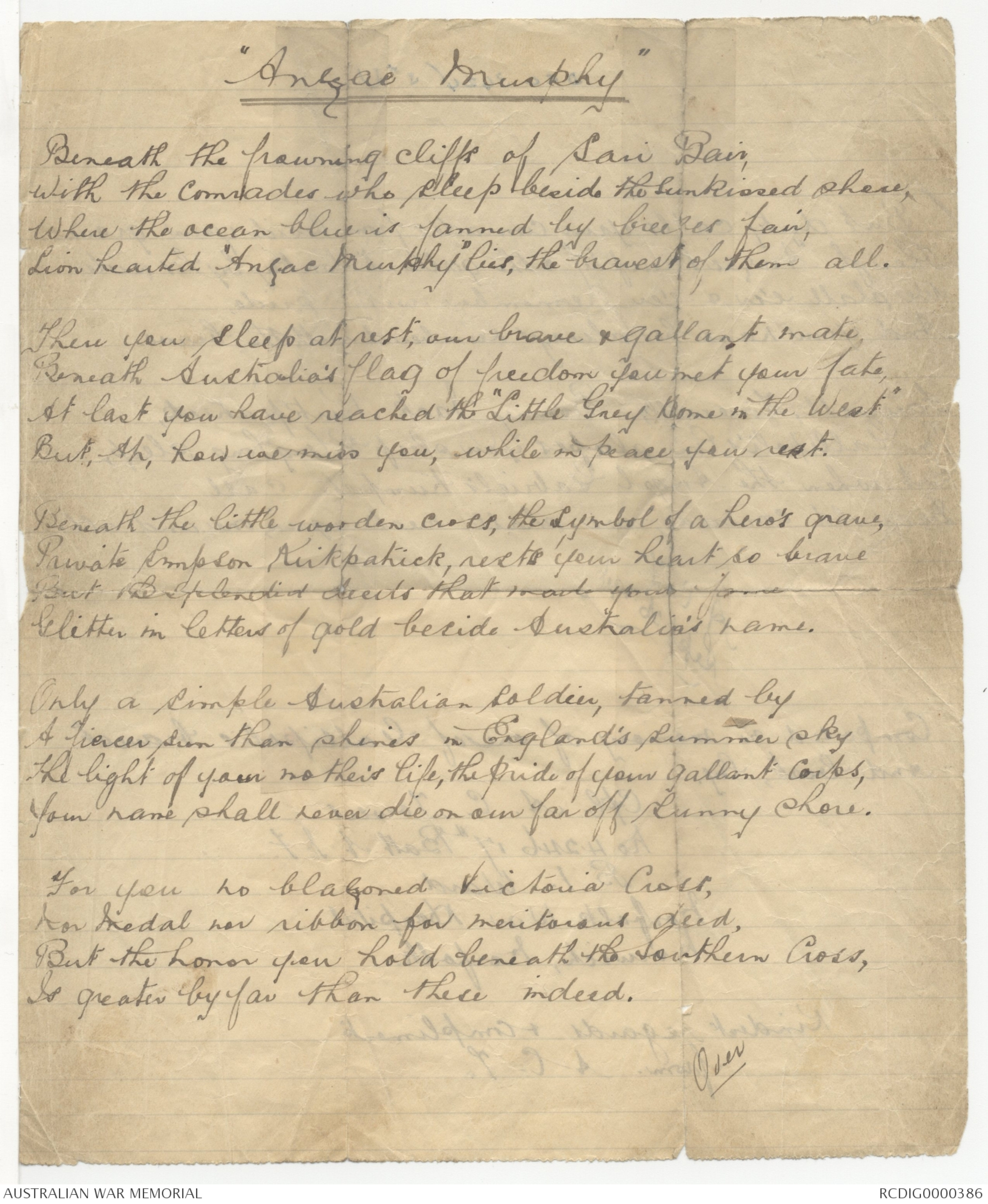
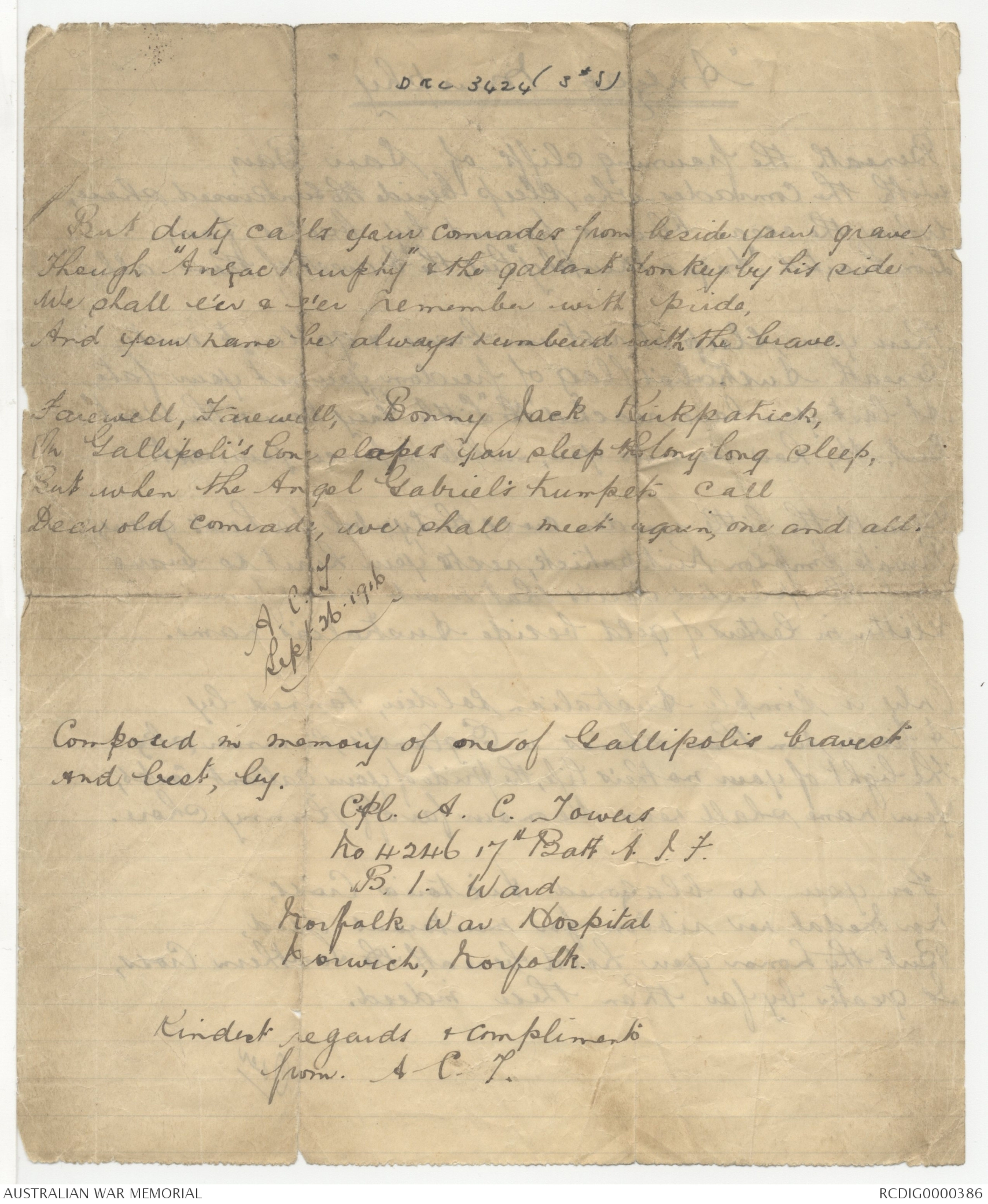
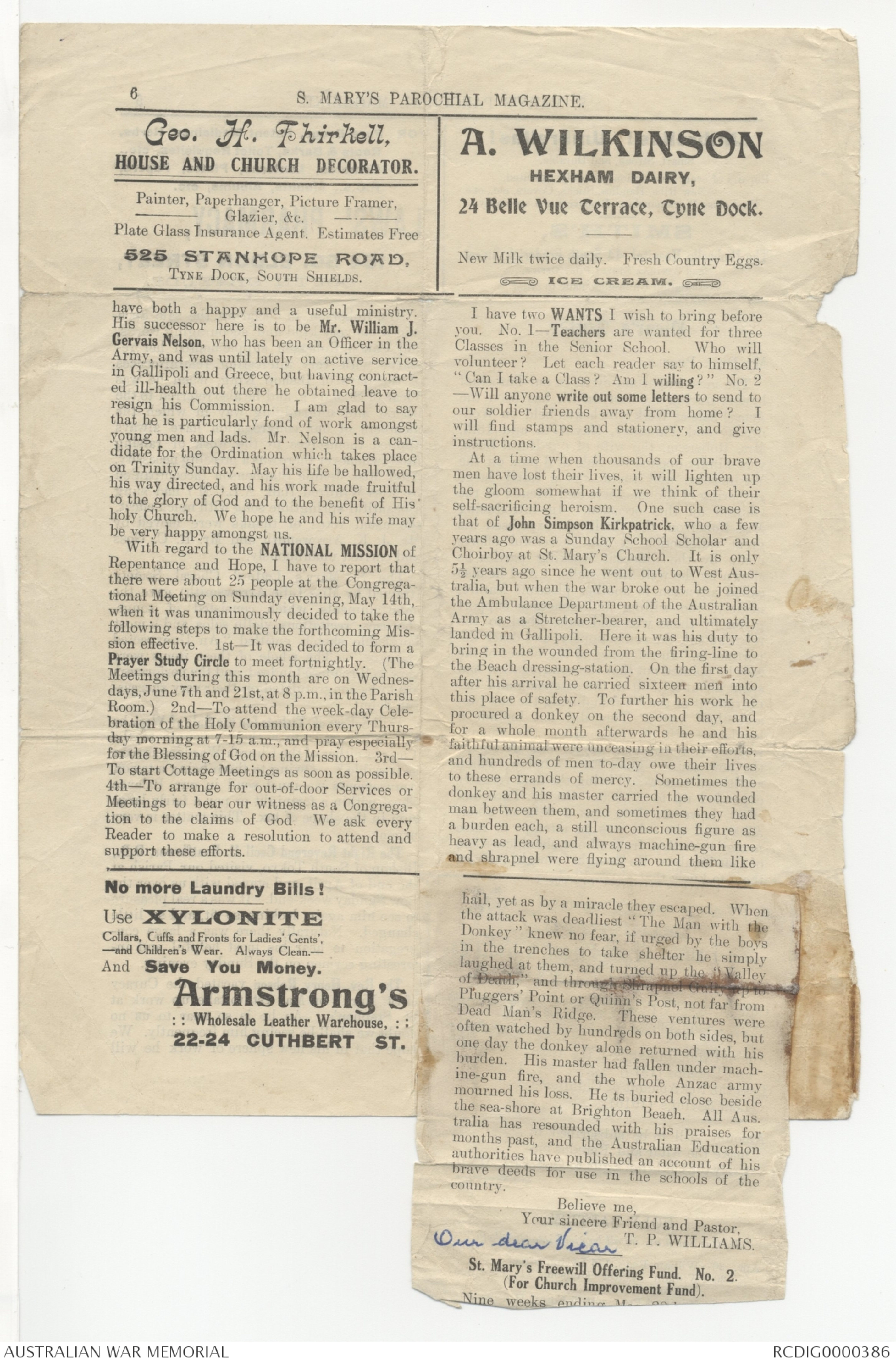
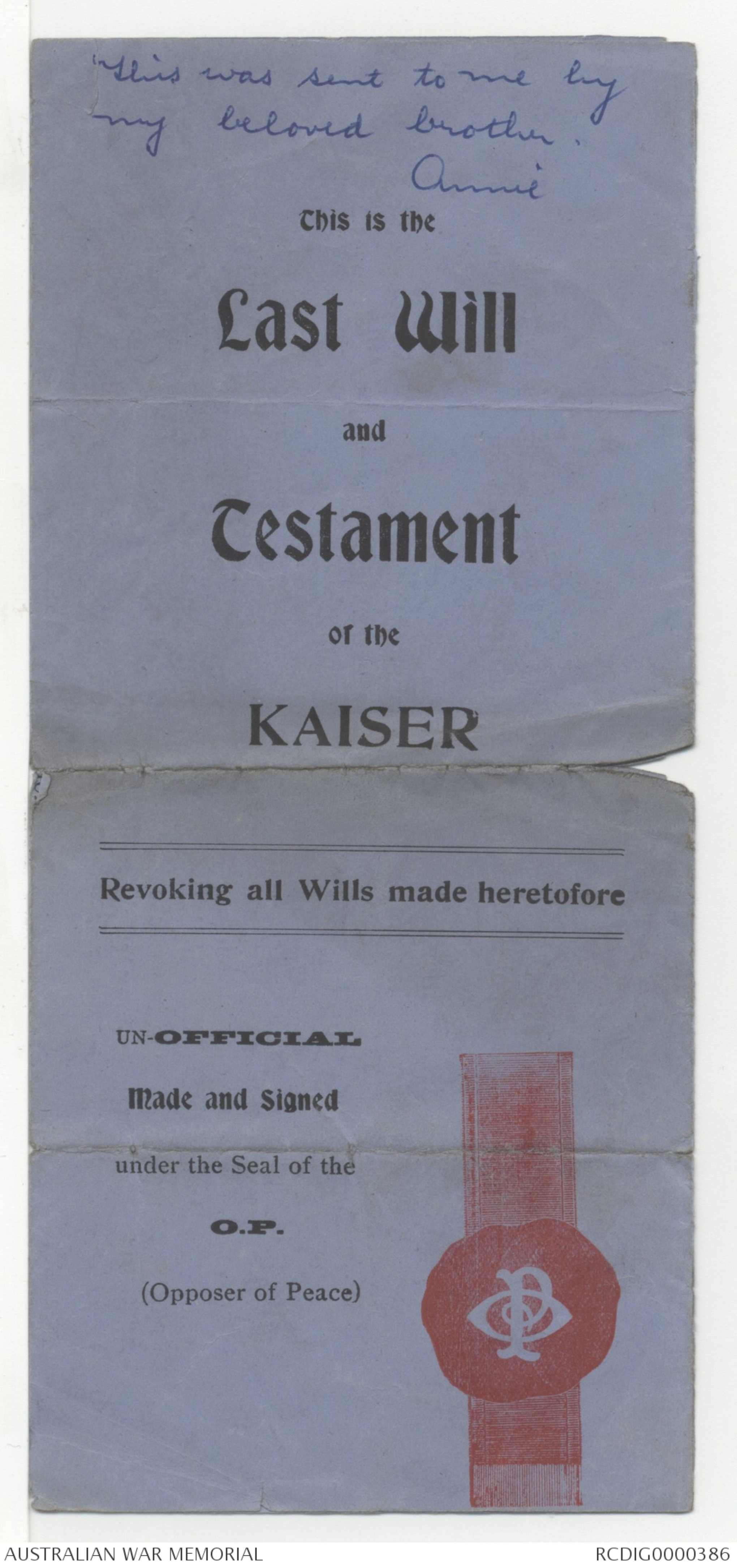
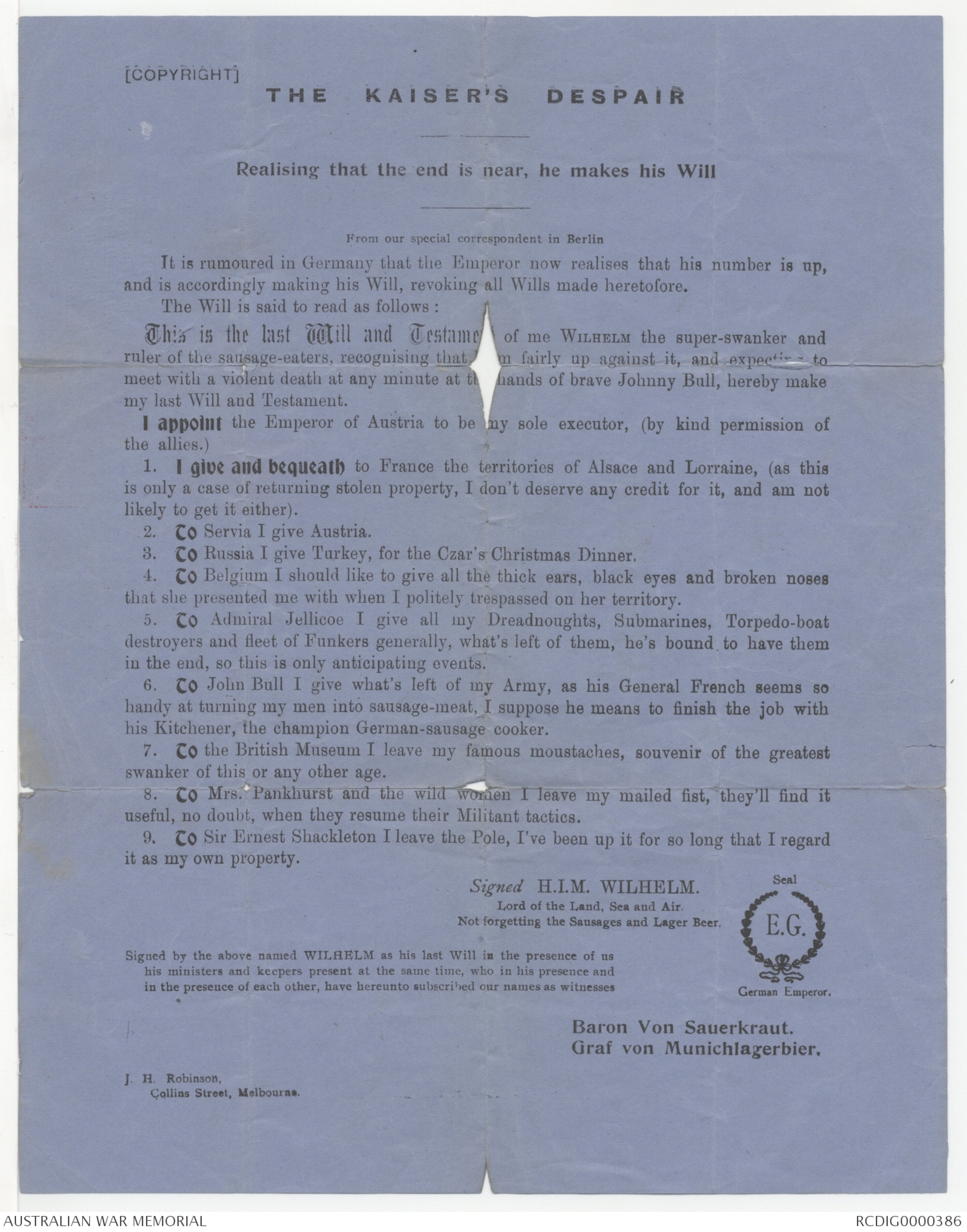

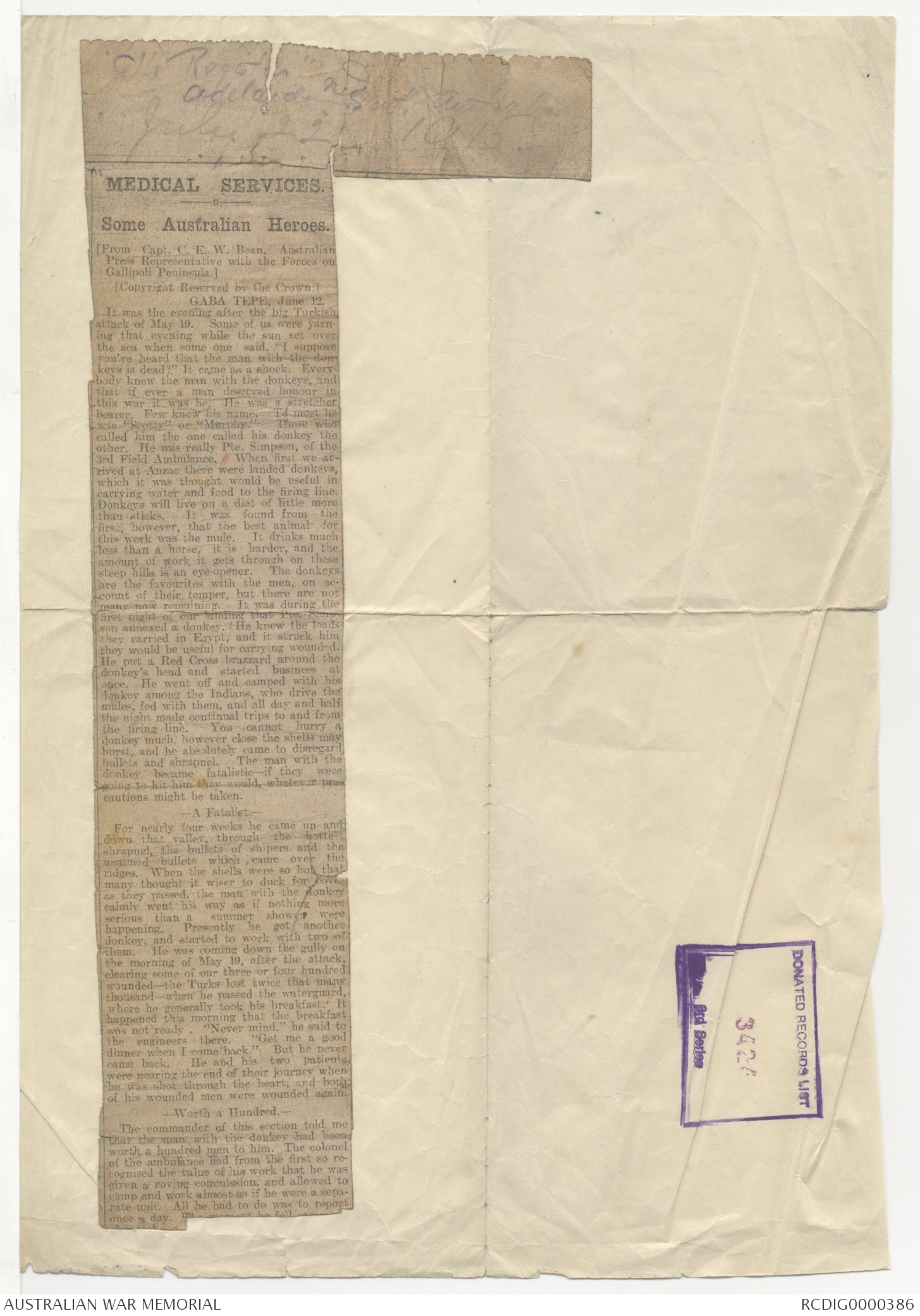
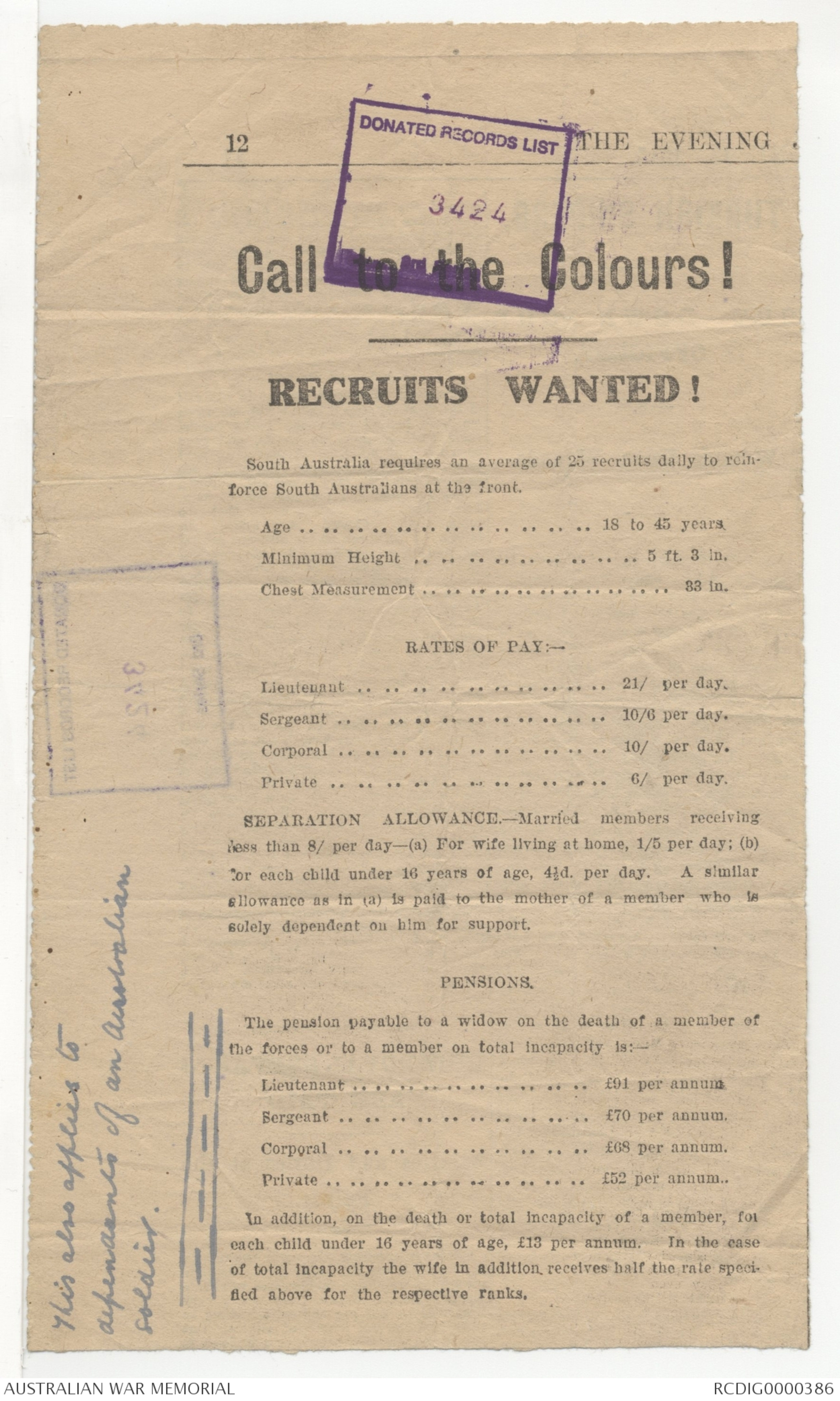
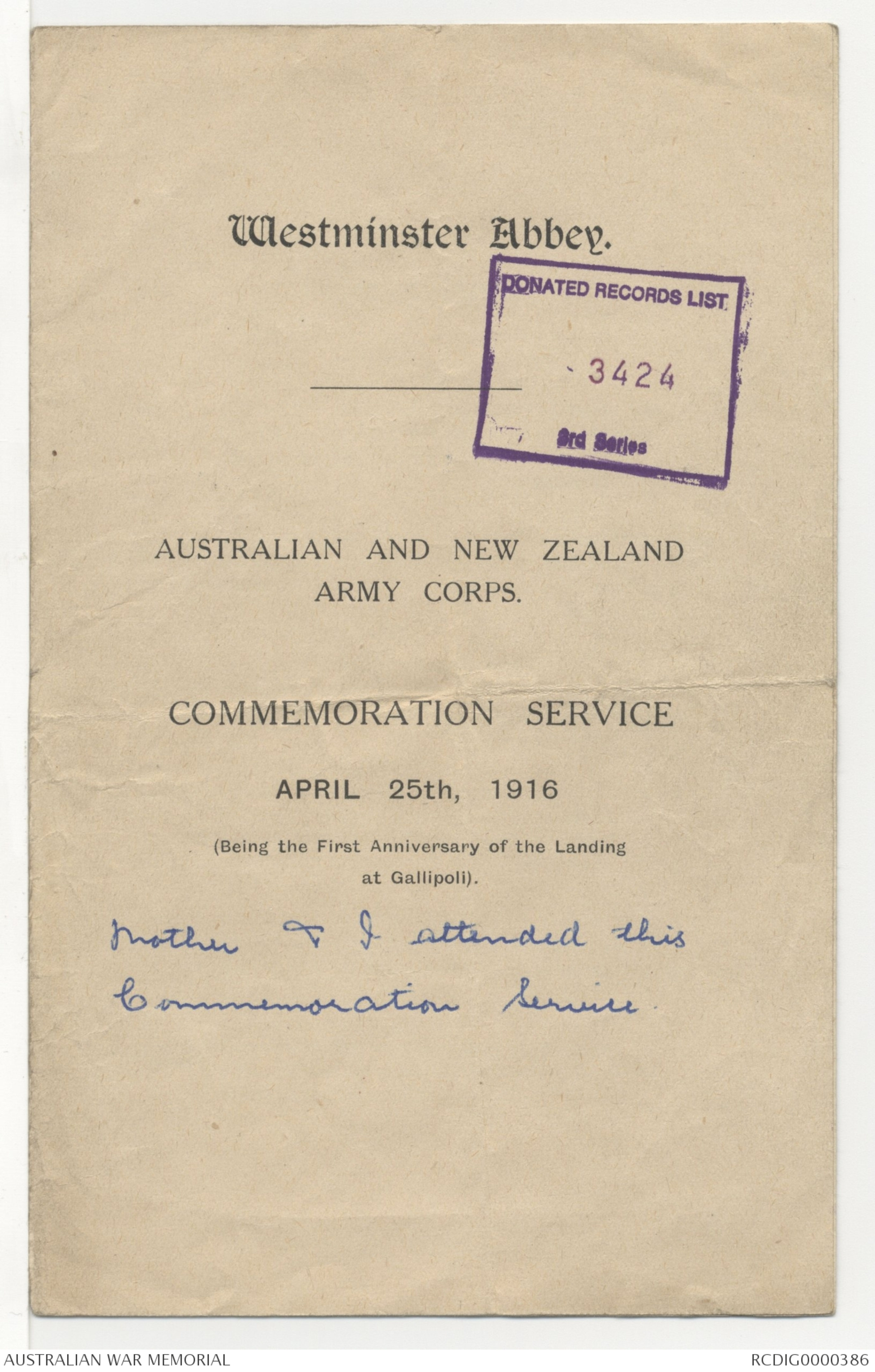
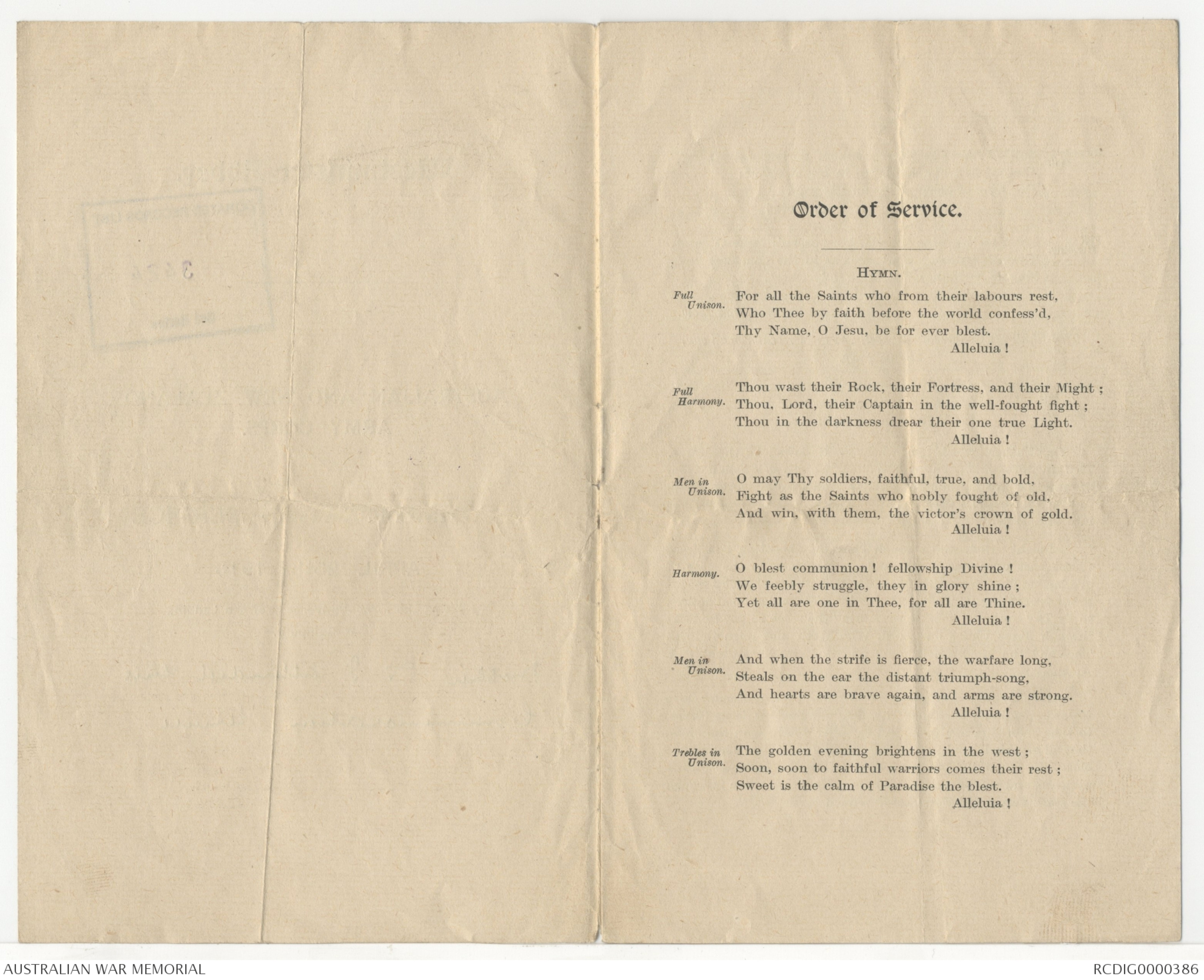
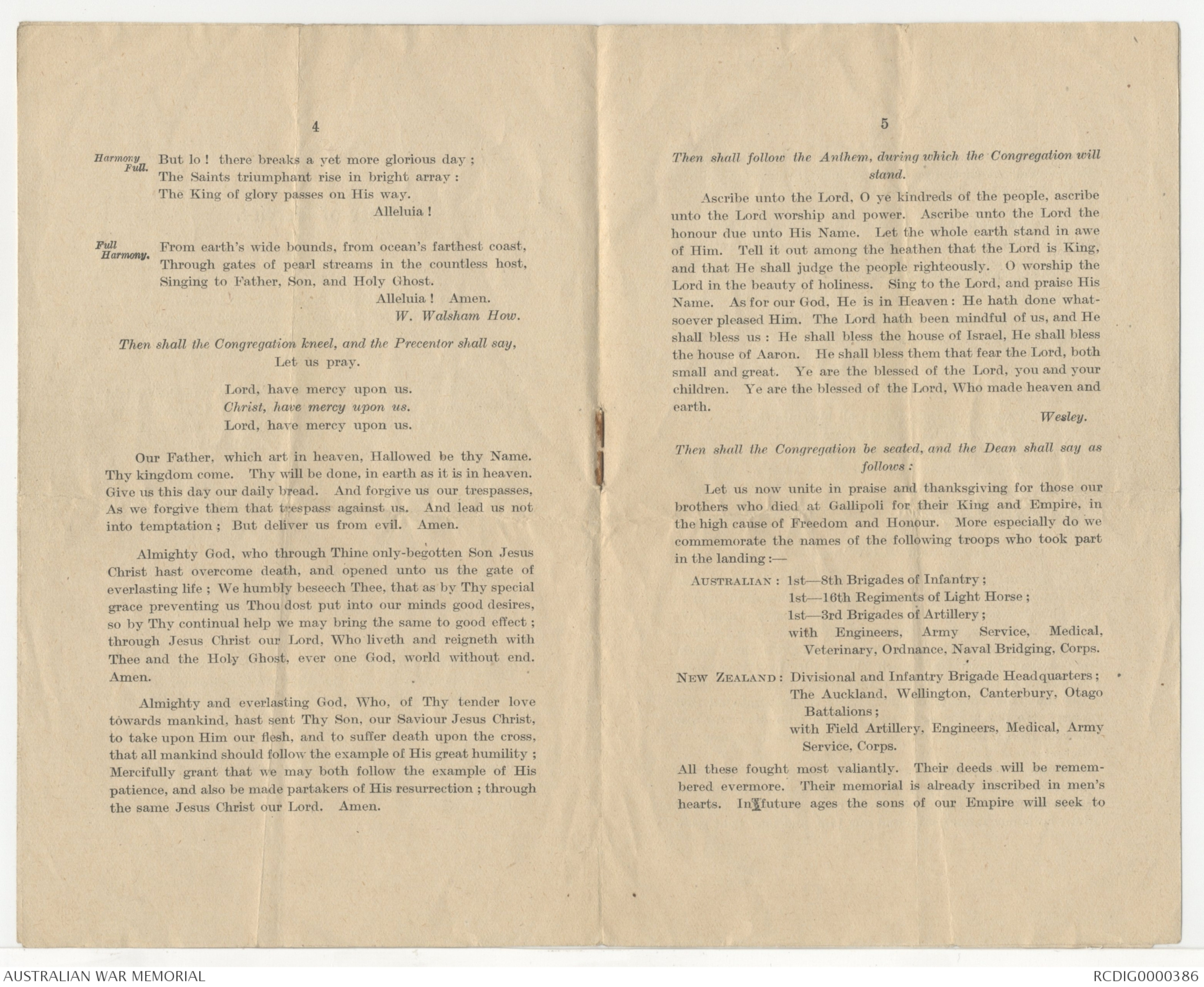
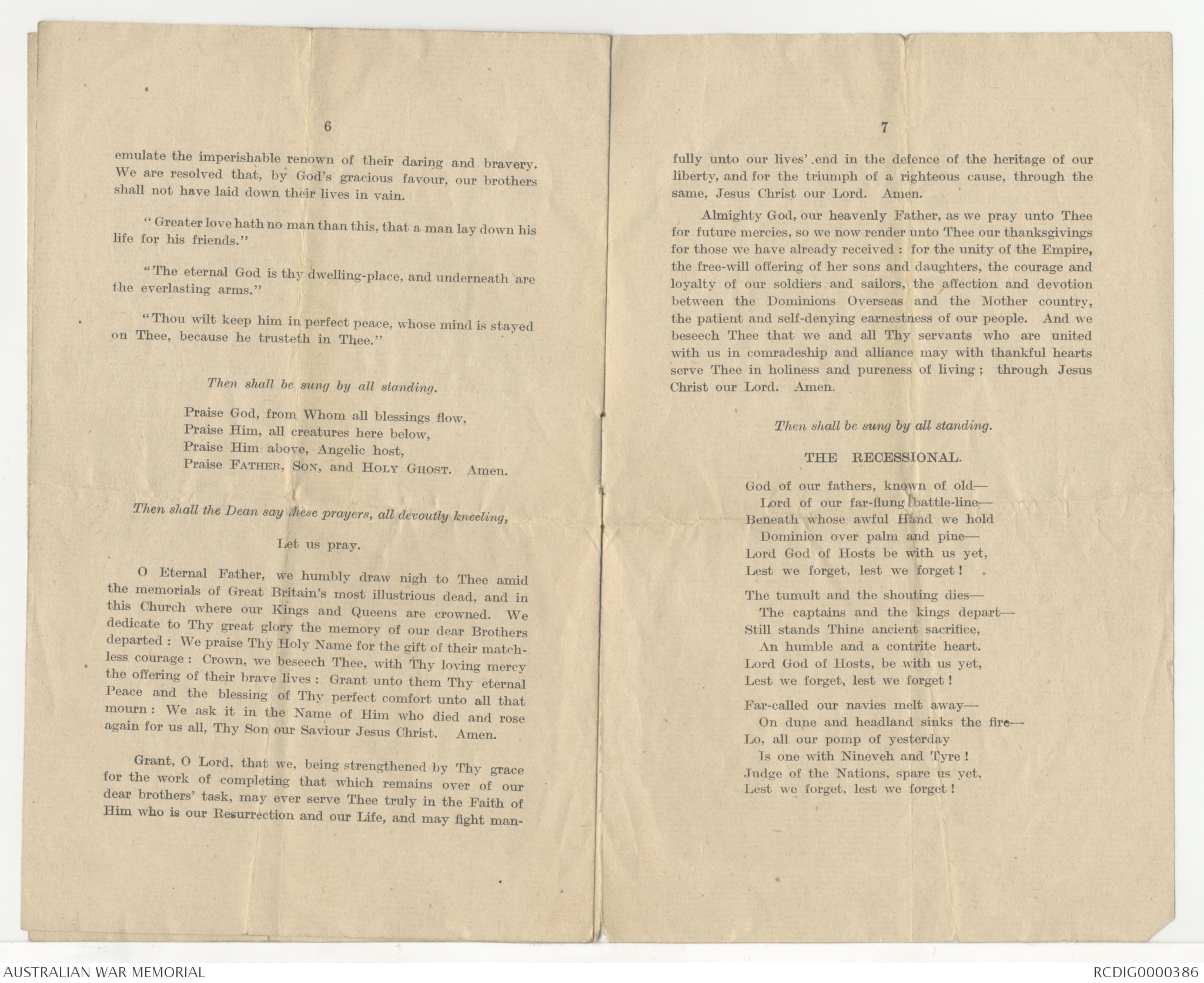
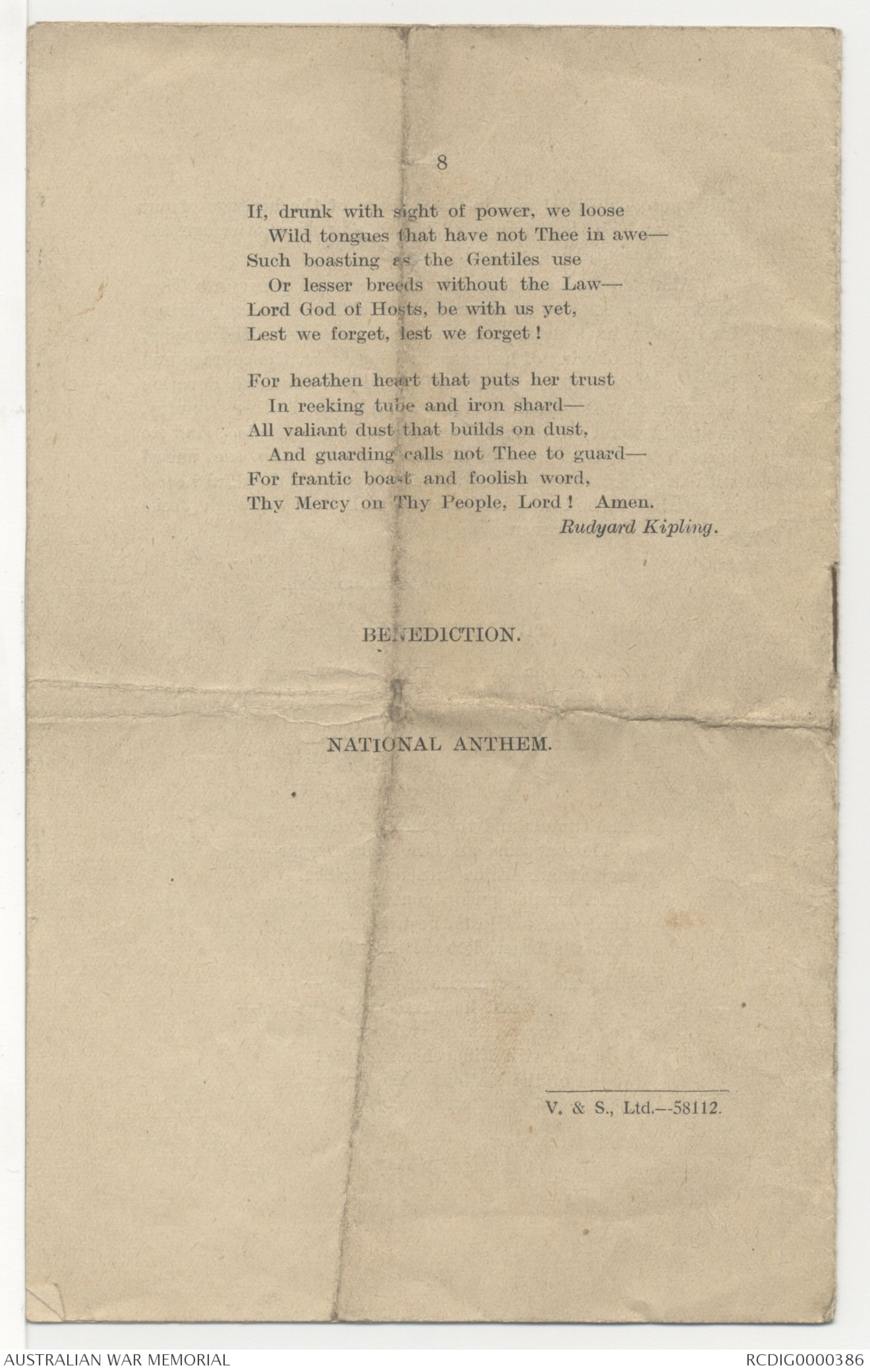
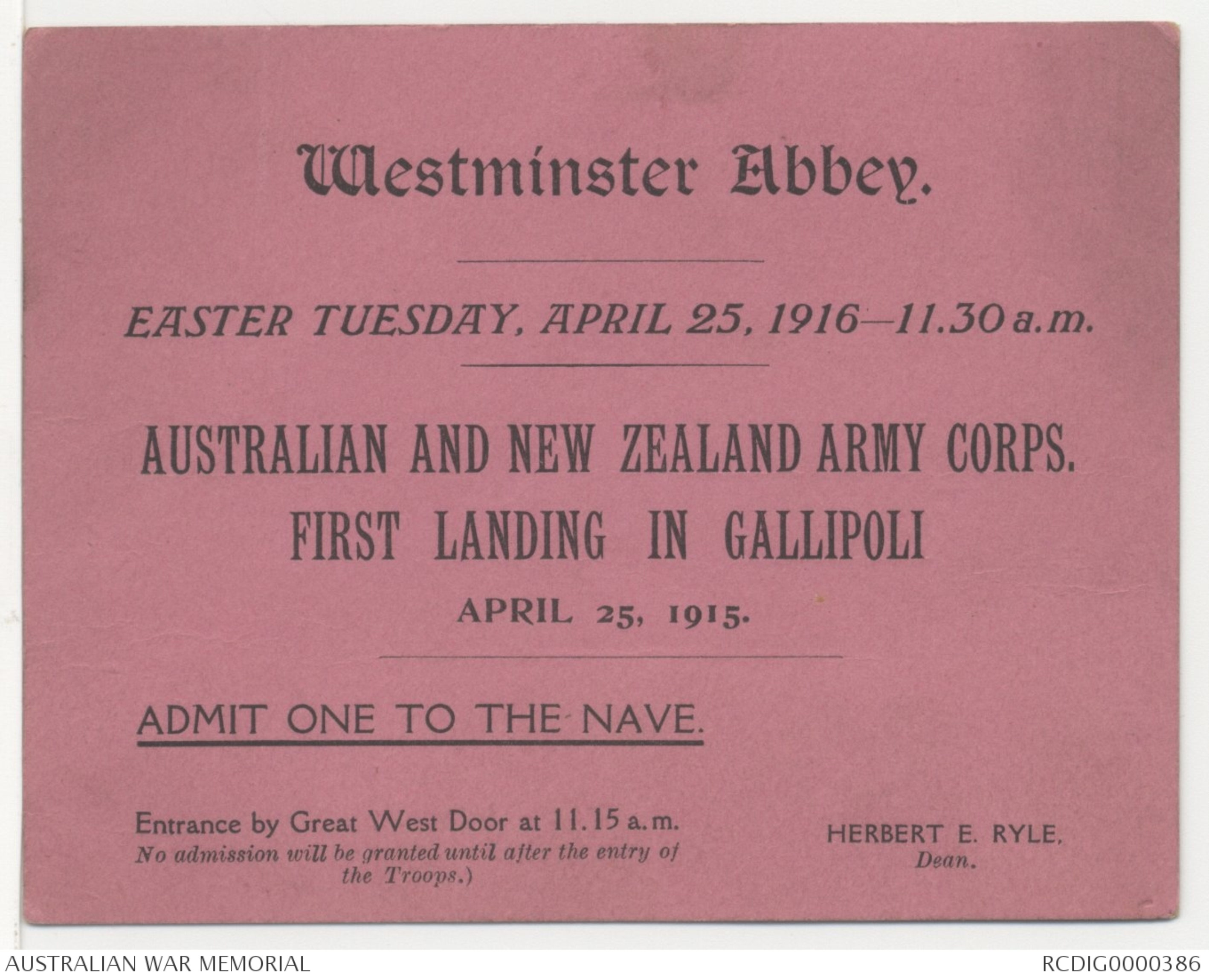
"Anzac Murphy"
Beneath the frowning cliffs of Sari Bair,
With the Comrades who sleep beside the sunkissed shore,
Where the ocean blue is fanned by breezes fair,
Lion hearted "Anzac Murphy" lies, the bravest of them all.
There you sleep at rest, our brave & gallant mate,
Beneath Australia's flag of freedom you met your fate,
At last you have reached the "Little Grey Home in the West"
But, Ah, how we miss you, while in peace you rest.
Beneath the little wooden cross, the Symbol of a hero's grave
Private Simpson Kirkpatrick, rests your heart so brave
But the splendid deeds that made your fame
Glitter in letters of gold beside Australia's name .
Only a simple Australian soldier, tanned by
A fiercer sun than shines in England's summer sky
The light of your mother's life, the pride of your gallant Corps,
Your name shall never die on our far off Sunny shore.
For you no blazoned Victoria Cross,
No medal nor ribbon for meritorous deed,
But the honor you hold beneath the Southern Cross,
Is greater by far than these indeed.
Over
DRC 342 (3*S)
But duty calls your Comrades from beside your grave
Though "Anzac Murphy" & the gallant donkey by his side
We shall e'er & e're remember with pride,
And your name be always remembered with the brave.
Farewell, Farewall Bonny Jack Kirkpatrick,
On Gallipoli's lone slopes you sleep the long long sleep
But when the Angel Gabriel's trumpets call
Dear old comrade, we shall meet again, one and all.
A.C.T.
Sept 26 .1916
Composed in memory of one of Gallipoli's bravest
And best, by.
Cpl. A.C. Towers
No 4246 17t Batt A. I. F.
B. 1. Ward
Norfolk War Hospital
Norwich, Norfolk.
Kindest regards & compliments
from. A C. T.
6. MARYS PAROCHIAL MAGAZINE.
Geo. H. Thirkell,
HOUSE AND CHURCH DECORATOR.
Painter, Paperhanger, Picture Framer,
Glazier, &c.
Plate Glass Insurance Agent. Estimates Free
525 STANHOPE ROAD,
TYNE DOCK, SOUTH SHIELDS.
__________________________________________
have both a happy and a useful ministry.
His successor here is to be Mr. William
Gervais Nelson, who has been an Officer in the
Army, and was until lately on active service
in Gallipoli and Greece, but having contract-
ed ill-health out there he obtained leave to
resign his Commission. I am glad to say
that he is particularly fond of work amongst
young men and lads. Mr. Nelson is a can-
didate for the Ordination which takes place
on Trinity Sunday. May his life be hallowed,
his way directed, and his work made fruitful
to the glory of God and to the benefit of His
holy Church. We hope he and his wife may
be very happy amongst us.
With regard to the NATIONAL MISSION of
Repentance and Hope, I have to report that
there were about 25 people at the Congrega-
tional Meeting on Sunday evening, May 14th,
when it was unanimously decided to take the
following steps to make the forthcoming Mis-
sion effective. Ist—It was decided to form a
Prayer Study Circle to meet fortnightly. (The
Meetings during this month are on Wednes-
days, June 7th and 2lst, at 8 p.m., in the Parish
Room.) 2nd—To attend the week-day Cele-
bration of the Holy Communion every Thurs-
day morning at 7-15 a.m., and pray especially
for the Blessing of God on the Mission. 3rd—
To start Cottage Meetings as soon as possible.
4th—To arrange for out-of-door Services or
Meetings to bear our witness as a Congrega-
tion to the claims of God. We ask every
Reader to make a resolution to attend and
support these efforts.
_____________________________________________
No more Laundry BilIs.
Use XYLONITE
Collars, Cuffs and Fronts for Ladies' Gents'.
— and Children's Wear, Always Clean.—
And Save You Money.
Armstrong's
:: Wholesale Leather Warchouse, ::
22-24 CUTHBERT ST.
A. WILKINSON
HEXHAM DAIRY,
24 Belle Vue Cerrace, Tyne Dock.
New Milk twice daily. Fresh Country Eggs.
ICE CREAM
_____________________________________________
I have two WANTS I wish to bring before
you. No. I—Teachers are wanted for three
Classes in the Senior School. Who will
volunteer? Let each reader say to himself,
"Can I take a Class? Am I willing? No. 2
—Will anyone write out some letters to send to
our soldier friends away from home? I
will find stamps and stationery, and give instructions.
At a time when thousands of our brave
men have lost their lives, it will lighten up
the gloom somewhat if we thing of their
self-sacrificing heroism. One such case is
that of John Simpson Kirkpatrick, who a few
years ago was a Sunday School Scholar and
Choirboy at St. Mary's Church. It is only
5½ years ago since he went out to West Aus-
tralia, but when the war broke out he joined
the Ambulance Department of the Australian
Army as a Stretcher-bearer, and ultimately
landed in Gallipoli. Here it was his duty to
bring in the wounded from the firing-line to
the Beach dressing-station. On the first day
after his arrival he carried sixteen men into
this place of safety. To further his work he
procured a donkey on the second day, and
for a whole month afterwards he and his
faithful animal were unceasing in their efforts,
and hundreds of men to-day owe their lives
to these errands of mercy. Sometimes the
donkey and his master carried the wounded
man between them, and sometimes they had
a burden each, a still unconscious figure as
heavy as lead, and always machine-gun fire
and shrapnel were flying around them like
hail, yet as by a miracle they escaped. When
the attack was deadliest? "The Man with the
Donkey" knew no fear, if urged by the boys
in the trenches to take shelter he simply
laughed at them, and turned up the "Valley
of Death", and through Shrapnel Gully up to
Pluggers’ Point or Quinn's Post, not far from
Dead Man's Ridge. These ventures were
often watched by hundreds on both sides, but
one day the donkey alone returned with his
burden. His master had fallen under mach-
ine-gun fire, and the whole Anzac army
mourned his loss. He ts buried close beside
the sea-shore at Brighton Beaeh. All Aus.
tralia has resounded with his praises for
months past, and the Australian Education
authorities have published an account of his
brave deeds for use in the schools of the
country.
Believe me,
Your sincere Friend and Pastor,
T. P. WILLLAMS.
Our dear Vicar
St. Mary's Freewill Offering Fund. No. 2.
(For Church improvement Fund).
Nine weeks ending xxxxxx
This was sent to me by
my beloved brother.
Annie
This is the
Last Will
and
Testament
of the
KAISER
Revoking all Wills made heretofore
UN-OFFICIAL
Made and signed
under the Seal of the
O.P.
(Opposer of Peace)
OP
(COPYRIGHT)
THE KAISER'S DESPAIR
Realising that the end is near, he makes his Will
From our special correspondent in Berlin
It is rumoured in Germany that the Emperor now realises that his number is up,
and is accordingly making his Will, revoking all Wills made heretofore.
The Will is said to read as follows:
This is the last Will and Testamexx
of me WILHELM the super-swanker and
ruler of the sausage-eaters, recognising that xxm fairly up against it, and expecting to
meet with a violent death at any minute at thx hands of brave Johnny Bull, hereby make
my last Will and Testament.
I appoint the Emperor of Austria to be
thy sole executor, (by kind permission of
the allies.)
1. I give and bequeath to France the territories of Alsace and Lorraine, (as this
is only a case of returning stolen property, I don't deserve any credit for it, and am not
likely to get it either).
2. To Servia I give Austria.
3. To Russia I give Turkey, for the Czar’s Christmas Dinner,
4. To Belgium I should like to give all the thick ears, black eyes and broken noses
that she presented me with when I politely trespassed on her territory.
5. To Admiral Jellicoe I give all my Dreadnoughts, Submarines, Torpedo-boat
destroyers and fleet of Funkers generally, what's left of them, he's bound to have them
in the end, so this is only anticipating events.
C. To John Bull I give what's left of my Army, as his General French seems so
handy at turning my men into sausage-meat, I suppose he means to finish the job with
his Kitchener, the champion German-sausage cooker.
7. To the British Museum I leave my famous moustaches, souvenir of the greatest
swanker of this or any other age.
8. To Mrs. Panthurst and the wild women I leave my mailed fist, they'II find it
useful, no doubt, when they resume their Militant tactics.
9. To Sir Ernest Shackleton I leave the Pole, I've been up it for so long that I regard
it as my own property.
Signed H.I.M. WILHELM.
Lord of the Land, Sea and Air
Not forgetting the Sausages and Lager Beer
Seal
E.G.
German Emperor.
Signed by the above named WILHELM as his last Will in the presence of us
his ministers and keepers present at the same time, who in his presence and
in the presence of each other, have hereunto subscribed our names as witnesses
Baron Von Sauerkraut.
Graf von Munichlagerbier.
J. H. Robinson,
Collins Street, Melbourne.
THE AUCKLAND WEEKLY NEWS.
MURPHY AND HIS DONKEY
BY NIKORA.
"Murphy and His Donkey" may be
purchased by the Auckland City Council
and hung in the art gallery or in
the war memorial museum. It is a
simple bit of water colour but it has a
meaning and a message for the soul of
the people.
It was one of sketches done on
Gallipoli by the late Sapper Moore-Jones,
a name that is a monument to sacrifice
and heroism just as was "Murphy", the
simple Australralian soldier who, by the
greatness of his soul and the splendour of
his courage, climbed the heights of fame
and became the shining example of all
that was strong and brave and noble in
the men of Gallipoli - the men of the
Royal Navy, who laughed and "carried
on" about those shining waters of endless
toil and danger; the men of the 29th
Division who fought, endured and died
below the slopes of Achi Baba; the stal-
warts of the Australian Imperial Force
who stormed the cliffs of Anzac and held
on; and our own men of the Expedition-
ary Force who shared the price and the
honour.
Artist and Hero.
The story of the late Sapper Moore-
Jones is familiar to the people of his own
city. In England when the war broke
our, he joined the New Zealand British
Section and found himself a sapper in
the Engineers. Safely through the Land-
ing he swung a pick on the ridges in the
stern struggle to make secure against the
coming challenge, the small span of
tumbled earth that had been won. When
his health broke down he did not go
away. As an artist he found a new job
and an opportunity to paint pictures far
more eloquent of the spirit of Anzac
than the written word.
From balloons anchored to vessels in
the roadstead, he viewed the land. He
saw the lines of trenches - the single
lines which had to be held because there
were no second positions. He saw the
"bivvies," on the safer slopes which men
called home, where they could have
their little cooking fires, sleep almost in
safety and dream of anything but the
throbbing boiling machine guns that
spoke of death through day and night
on the cliff tops. He saw the tracks that
had been cut round the slopes and the
snake-like lines which toiled upwards
with water and rations and food for the
guns.He saw the stretchers coming
downward with their burdens of pain and
broken youth and, maybe, in sheltered
hollows he saw groups of men laying
comrades to sleep in shallow graves,
their blankets used for shrouds.
Hung in midair he saw it all and felt
it all and he painted it with his heart's
blood.
And the artist came home to die in the
Anzac way. He rushed back in to a
burning building to try to save women
and there received his death wounds.
The Man "Murphy."
"Murphy" the subject of the sketch
was and individual. He was on Galli-
poli as great an individualist as was Dick
Travers V.C. in the New Zealand Divsion
in France. He became a separate unit
of one, - one and a donkey. The perculiar
conditions of the campaign and the
elasticity of the colonial system of dis-
cipline made this possible. His real name
Kirkpatrick - Private John SImpson
Kirkpatrick, No. 202, 3rd Field Ambul-
ance, A.I.F. He was by occupation a
ship's fireman, he was 23 years of age and
he was a native of South Shields, Eng-
land. Captain C. E. W. Bean, the Aus-
tralian war correspondent and historian,
has told the story of "Murphy" some-
times known as "Scottie" and of his
donkey which bore the name of "Duffy."
Greek donkey drivers had been landed
on Gallopoli but were deported the same
day, and their donkeys were left behind
to stray about the gullies. "Murphy"
took possession of one of them and used
it for carrying wounded men who could
endure such a ride. From the night of
the Landing until May 19, he worked
each day and half of every night between
the head of Monash Valley and the
beach, his donkey carrying a brassard on
its forehead and a man on its back. He
escaped death so often, says the historian,
that he was completely fatalistic; the
deadly sniping down the valley and the
furious shrapnel fire never stopped him.
The colonel of his ambulance, recognising
the value of his work, allowed him to
carry on as a separate unit. He camped
with his donkey at the Indian mule-
camp, and had to report at the field am-
bulance only once a day. Presently he
went up the valley past the water-
guard where he generally had his break-
fast, but it was not ready. "Never
mind" he called, " get me a good din-
ner when I come back."
He never came back. With two pat-
ients he was coming down the creekbed
when he was shot through the heart,
both the wounded men being wounded
again. He had carried many scores of
men down the valley and had saved many
lives.
Import of the Picture.
Mr. Moore-Jones did not believe that
this picture had much artistic merit,
but in this case the subject is what
counts most. And the subject is not only
the character depicted. From those
haunting eyes there shines the courage and
endurance and spirit of sacrifice by which
the war was won. Will the people of to-
morrow see this in the picture? Will the
children be taught not merely the history
of the war but the spiritual significance
of the high courage and the ready sacri-
fice? Will their eyes be directed to
lofty heights from which, please God
the mists of material consideration will
one day lift? Will there be a truer sense
of value when the aftermath of the
storm is past!
The Register
Adelaide South Australia
July 22 1915
MEDICAL SERVICES.
Some Australian Heroes.
[From Capt. C. E. W. Bean, Australian
Press Representative with the Forces on
Gallipoli Peninsula.]
[Copyright Preserved by the Cown]
GABA TEPE, June 12.
It was the evening after the big Turkish
attack of May 19. Some of us were yarn-
ing that evening while the sun set over
the sea when some one said. "I suppose
you've heard that the man with the don-
keys is dead? It came as a shock. Every-
body knew the man with the donkeys, and
that if ever a man deserved honour in
this war it was he. He was a stretcher
bearer. Few knew his name. To most he
was "Scotty" or "Murphy." Those who
called him the one called his donkey the
other. He was really Pte. Simpson, of the
3rd Field Ambulance. When first we ar-
rived at Anzac there were landed donkeys,
which it was thought would be useful in
carrying water and food to the firing line.
Donkeys will live on a diet of little more
than sticks. It was found from the
first, however, that the best animal for
this work was the mule. It drinks much
less than a horse, it is harder, and the
amount of work it gets through on these
steep hills is an eye-opener. The donkeys
are the favourites with the men, on ac-
count of their temper, but there are not
many now remaining. It was during the
first night of our landing that Pte. Simp-
son annexed a donkey. He knew the loads
they carried in Egypt, and it struck him
they would be useful for carrying wounded.
He put a Red Cross brazzard around the
donkey's head and started business at
once. He went off and camped with his
donkey among the Indians, who drive the
mules, fed with them, and all day and half
the night made continual trips to and from
the firing line. You cannot hurry a
donkey much, however close the shells may
burst, and he absolutely come to disregard
bullets and shrapnel. The man with the
donkey became fatalistic - if they were
going to hit him they would, whatever pre-
cautions might be taken.
—A Fatalist.—
For nearly four weeks he came up and
down that valley, through the hottest
shrapnel, the bullets of snipers and the
unaimed bullets which came over the
ridges. When the shells were so hot that
many thought it wiser to duck for cover
as they passed, the man with the donkey
calmly went his way as if nothing more
serious than a summer shower were
happening. Presently he got another
donkey, and started to work with two of
them. He was coming down the gully on
the morning of May 19, after the attack,
clearing some of our three or four hundred
wounded - the Turks lost twice that many
thousand - when he passed the waterguard,
where he generally took his breakfast. It
happened this morning that the breakfast
was not ready. "Never mind," he said to
the engineers there. "Get me a good
dinner when I come back." But he never
came back. He and his two patients
were nearing the end of their journey when
he was shot through the heart, and both
of his wounded men were wounded again.
—Worth a Hundred—
The commander of this sections told me
that the man with the donkey had been
worth a hundred men to him. The colonel
of the ambulance had from the first so re-
cognised the value of his work that he was
given a roving commission, and allowed to
camp and work almost as if he were a sepa-
rate unit. All he had to do was to report
once a day.
DONATED RECORDS LIST
3424
3RD SERIES
DONATED RECORDS LIST
3424
12 THE EVENING
Call to the Colours!
RECRUITS WANTED !
South Australia reguires an average of 25 recrutts daily to rein-
force South Australians at the front.
Age.. .. .. .. .. .. .. .. .. .. .. 18 to 45 years.
Minimum Height .. .. .. .. .. ..5ft. 3 in.
Chest measurement.. .. .. .. .. ..33 in.
RATES OF PAY:—
Lieutenant .. .. .. .. .. 21/ per day.
Sergeant .. .. .. .. .. .. 10/6 per day.
Corporal .. .. .. .. .. .. ..10/ per day.
Private .. .. .. .. .. .. .. .. 6/ per day.
SEPARATION ALLOWANCE—Married members receiving
less than 8/ per day — (a) For wife living at home, 1/5 per day; (b)
for each child under 16 years of age, 4½d. per day. A similar
allowance as in (a) to paid to the mother of a member who is
solely dependent on him for support.
PENSIONS.
The pension payable to a widow on the death of a member of
the forces or to a member on total incapacity is:—
Lieutenant .. .. .. .. .. .. .. .. ..£91 per annum.
Sergeant .. .. .. .. .. .. .. .. .. ..£70 per annum.
Corporal .. .. .. .. .. .. .. .. .. .. ..£68 per annum.
Private .. .. .. .. .. .. .. .. .. .. .. ..£52 per annum.
In addition, on the death or total incapacity of a member, for
each child under 16 years of age, £13 per annum. In the case.
of total incapacity the wife in addition receives half the rate speci-
fied above for the respective ranks.
[* This also applies to
dependants of an Australian
Soldier.*]
Westminster Abbey.
DONATED RECORDS LIST
3424
3rd series
AUSTRALLAN AND NEW ZEALAND
ARMY CORPS.
COMMEMORATION SERVICE
APRIL 25th, 1916
(Being the First Anniversary of the Landing
at Gallipoli).
Mother
Mother & I attended this
Commemoration Service
Order of Service.
__________________
HYMN.
Full Unison.
For all the Saints who from their labours rest,
Who Thee by faith before the world confess’d,
Thy Name, O Jesu, be for ever blest.
Alleluia!
Full Harmony.
Thou wast their Rock, their Fortress, and their Might;
Thou, Lord, their Captain in the well-fought fight;
Thou in the darkness drear their one true Light.
Alleluia!
Men in Unison
O may Thy soldiers, faithful, true, and bold,
Fight as the Saints who nobly fought of old,
And win, with them, the victor's crown of gold.
Alleluia!
Harmony.
O blest communion! fellowship Divine !
We feebly struggle, they in glory shine;
Yet all are one in Thee, for all are Thine.
Alleluia!
Men in Unison.
And when the strife is fierce, the warfare long,
Steals on the ear the distant triumph-song,
And hearts are brave again, and arms are strong.
Alleluia!
Trebles in Unison.
The golden evening brightens in the west;
Soon, soon to faithful warriors comes their rest;
Sweet is the calm of Paradise the blest.
Alleluia!
4.
Harmony Full.
But lo! there breaks a yet more glorious day;
The Saints triumphant rise in bright array:
The King of glory passes on His way.
Alleluia!
Full Harmony.
From earth's wide bounds, from ocean's farthest coast,
Through gates of pearl streams in the countless host,
Singing to Father, Son, and Holy Ghost.
Alleluia! Amen.
W. Walsham How.
Then shall the Congregation kneel, and the Precentor shall say,
Let us pray.
Lord, have mercy upon us.
Christ, have mercy upon us.
Lord, have mercy upon us.
Our Father, which art in heaven, Hallowed be thy Name.
Thy Kingdom come. Thy will be done, in earth as it is in heaven.
Give us this day our daily bread. And forgive us our trespasses,
As we forgive them that trespass against us. And lead us not
into temptation; But deliver us from evil. Amen.
Almighty God, who through Thine only-begotten Son Jesus
Christ hast overcome death, and opened unto us the gate of
everlasting life; We humbly beseech Thee, that as by Thy special
grace preventing us Thou dost put into our minds good desires,
so by Thy continual help we may bring the same to good effect;
through Jesus Christ our Lord, Who liveth and reigneth with
Thee and the Holy Ghost, ever one God, world without end.
Amen.
Almighty and everlasting God, Who, of Thy tender love
towards mankind, hast sent Thy Son, our Saviour Jesus Christ,
to take upon Him our flesh, and to suffer death upon the cross,
that all mankind should follow the example of His great humility;
Mercifully grant that we may both follow the example of His
patience, and also be made partakers of His resurrection; through
the same Jesus Christ our Lord. Amen.
5
Then shall follow the Anthem, during which the Congregation will
stand.
Ascribe unto the Lord, O ye kindreds of the people, ascribe
unto the Lord worship and power. Ascribe unto the Lord the
honour due unto His Name. Let the whole earth stand in awe
of Him. Tell it out among the heathen that the Lord is King,
and that He shall judge the people righteously. O worship the
Lord in the beauty of holiness. Sing to the Lord, and praise His
Name. As for our God, He is in Heaven: He hath done what-
soever pleased Him. The Lord hath been mindful of us, and He
shall bless us: He shall bless the house of Israel, He shall bless
the house of Aaron. He shall bless them that fear the Lord, both
small and great. Ye are the blessed of the Lord, you and your
children. Ye are the blessed of the Lord, Who made heaven and
earth.
Wesley.
Then shall the Congregation be seated, and the Dean shall say as
follows:
Let us now unite in praise and thanksgiving for those our
brothers who died at Gallipoli for their King and Empire, in
the high cause of Freedom and Honour. More especially do we
commemorate the names of the following troops who took part
in the landing:
AUSTRALIAN: Ist—8th Brigades of Infantry;
1st—16th Regiments of Light Horse;
Ist—3rd Brigades of Artillery;
with Engineers, Army Service, Medical,
Veterinary, Ordnance, Naval Bridging, Corps.
NEW ZEALAND: Divisional and Infantry Brigade Headquarters;
The Auckland, Wellington, Canterbury, Otage
Battalions;
with Field Artillery, Engineers, Medical, Army
Service, Corps.
All these fought most valiantly. Their deeds will be remem-
bered evermore. Their memorial is already inscribed in men's
hearts. In future ages the sons of our Empire will seek to
6
emulate the imperishable renown of their daring and bravery.
We are resolved that, by God's gracious favour, our brothers
shall not have laid down their lives in vain.
"Greater love hath no man than this, that a man lay down his
life for his friends."
"The eternal God is thy dwelling-place, and underneath are
the everlasting arms."
"Thou wilt keep him in perfect peace, whose mind is stayed
on Thee, because he trusteth in Thee."
Then shall be sung by all standing.
Praise God, from Whom all blessings How,
Praise Him, all creatures here below,
Praise Him above, Angelic host,
Praise FATHER, SON, and HOLY GHOST. Amen.
Then shall the Dean say these prayers, all devoutly kneeling
Let us pray.
O Eternal Father, we humbly draw nigh to Thee amid
the memorials of Great Britain's most illustrious dead, and in
this Church where our Kings and Queens are crowned. We
dedicate to Thy great glory the memory of our dear Brothers
departed: We praise Thy Holy Name for the gift of their match-
less courage: Crown, we beseech Thee, with Thy loving mercy
the offering of their brave lives: Grant unto them Thy eternal
Peace and the blessing of Thy perfect comfort unto all that
mourn: We ask it in the Name of Him who died and rose
again for us all, Thy Son our Saviour Jesus Christ. Amen.
Grant, O Lord, that we, being strengthened by Thy grace
for the work of completing that which remains over of our
dear brothers’ task, may ever serve Thee truly in the Faith of
Him who is our Resurrection and our Life, and may fight man-
7
fully unto our lives' end in the defence of the heritage of our
liberty, and for the triumph of a righteous cause, through the
same, Jesus Christ our Lord. Amen.
Almighty God, our heavenly Father, as we pray unto Thee
for future mercies, so we now render unto Thee our thanksgivings
for those we have already received : for the unity of the Empire,
the free-will offering of her sons and daughters, the courage and
loyalty of our soldiers and sailors, the affection and devotion
between the Dominions Overseas and the Mother country,
the patient and self-denying earnestness of our people. And we
beseech Thee that we and all Thy servants who are united
with us in comradeship and alliance may with thankful hearts
serve Thee in holiness and pureness of living; through Jesus
Christ our Lord. Amen.
Then shall be sung by all standing.
THE RECESSIONAL.
God of our fathers, known of old—
Lord of our far-flung battle-line —
Beneath whose awful Hand we hold
Dominion over palm and pine—
Lord God of Hosts be with us yet,
Lest we forget, lest we forget!
The tumult and the shouting dies—
The captains and the Kings depart—
Still stands Thine ancient sacrifice,
An humble and a contrite heart.
Lord God of Hosts, be with us yet,
Lest we forget, lest we forget!
Far-called our navies melt away—
On dune and headland sinks the fire—
Lo, all our pomp of yesterday
Is one with Nineveh and Tyre!
Judge of the Nations, spare us yet.
Lest we forget, lest we forget!
8
If, drunk with sight of power, we loose
Wild tongues that have not Thee in awe—
Such boasting as the Gentiles use
Or lesser breeds without the Law—
Lord God of Hosts, be with us yet,
Lest we forget, lest we forget!
For heathen heart that puts her trust
In reeking tube and iron shard—
All valiant dust that builds on dust,
And guarding calls not Thee to guard—
For frantic boast and foolish word,
Thy Mercy on Thy People, Lord! Amen.
Rudyard Kipling.
BENEDICTION
NATIONAL ANTHEM.
V. & S., Ltd.— -58112.
Westminster Abbey.
EASTER TUESDAY, APRIL 25, 1916—11.30 a.m.
AUSTRALIAN AND NEW ZEALAND ARMY CORPS.
FIRST LANDING IN GALLIPOLI
APRIL 25, 1915.
ADMIT ONE TO THE NAVE.
Entrance by Great West Door at 11.15 a.m.
No admission will be granted until after the entry of
the Troops.)
HERBERT E. RYLE
Dean.
 Jacqueline Kennedy
Jacqueline KennedyThis transcription item is now locked to you for editing. To release the lock either Save your changes or Cancel.
This lock will be automatically released after 60 minutes of inactivity.